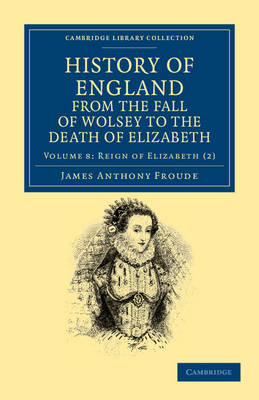History of England from the Fall of Wolsey to the Death of Elizabeth 12 Volume Set
5 primary works
Volume 6
History of England from the Fall of Wolsey to the Death of Elizabeth
by James Anthony Froude
Published 25 January 2009
James Anthony Froude (1818–94), historian and disciple of Carlyle, published this twelve-volume history of the English Reformation between 1858 and 1870. The work is shaped by Froude's firm belief that the Reformation enabled the development of modernity and the rise of 'progressive intelligence' in England. His polemical stance was criticised by some historians, but his engaging narrative style and elegant prose made his work extremely popular with the general public, and the books were highly influential. The first six volumes consider the course of the Reformation from the break with Rome until the accession of Elizabeth I in 1558, and the remaining six recount the reign of Elizabeth I, ending with the defeat of the Spanish Armada. Volume 8 goes back to consider the condition of Ireland during Mary I's reign, the rise of the English navy, and the significance of Mary Stuart.
Volume 9
James Anthony Froude (1818-94), historian and disciple of Carlyle, published this twelve-volume history of the English Reformation between 1858 and 1870. The work is shaped by Froude's firm belief that the Reformation enabled the development of modernity and the rise of 'progressive intelligence' in England. His polemical stance was criticised by some historians, but his engaging narrative style and elegant prose made his work extremely popular with the general public, and the books were highly influential. The first six volumes consider the course of the Reformation from the break with Rome until the accession of Elizabeth I in 1558, and the remaining six recount the reign of Elizabeth I, ending with the defeat of the Spanish Armada. Volume 9 covers Mary Stuart's marriage to Bothwell and her subsequent abdication, Protestantism in Europe, and the downfall of the Duke of Norfolk.
Volume 10
James Anthony Froude (1818-94), historian and disciple of Carlyle, published this twelve-volume history of the English Reformation between 1858 and 1870. The work is shaped by Froude's firm belief that the Reformation enabled the development of modernity and the rise of 'progressive intelligence' in England. His polemical stance was criticised by some historians, but his engaging narrative style and elegant prose made his work extremely popular with the general public, and the books were highly influential. The first six volumes consider the course of the Reformation from the break with Rome until the accession of Elizabeth I in 1558, and the remaining six recount the reign of Elizabeth I, ending with the defeat of the Spanish Armada. Volume 10 considers Elizabeth's role as head of the church, affairs in Scotland and Ireland, and the St Bartholomew's Eve massacre in France.
Volume 11
James Anthony Froude (1818-94), historian and disciple of Carlyle, published this twelve-volume history of the English Reformation between 1858 and 1870. The work is shaped by Froude's firm belief that the Reformation enabled the development of modernity and the rise of 'progressive intelligence' in England. His polemical stance was criticised by some historians, but his engaging narrative style and elegant prose made his work extremely popular with the general public, and the books were highly influential. The first six volumes consider the course of the Reformation from the break with Rome until the accession of Elizabeth I in 1558, and the remaining six recount the reign of Elizabeth I, ending with the defeat of the Spanish Armada. Froude changed the title of this eleventh volume, having decided that the Armada marked the defeat of Catholicism in England, and the appropriate conclusion to his work.
Volume 12
James Anthony Froude (1818-94), historian and disciple of Carlyle, published this twelve-volume history of the English Reformation between 1858 and 1870. The work is shaped by Froude's firm belief that the Reformation enabled the development of modernity and the rise of 'progressive intelligence' in England. His polemical stance was criticised by some historians, but his engaging narrative style and elegant prose made his work extremely popular with the general public, and the books were highly influential. The first six volumes consider the course of the Reformation from the break with Rome until the accession of Elizabeth I in 1558, and the remaining six recount the reign of Elizabeth I, ending with the defeat of the Spanish Armada. Froude changed the title of this twelfth volume, having decided that the Armada marked the defeat of Catholicism in England, and the appropriate conclusion to his work.

